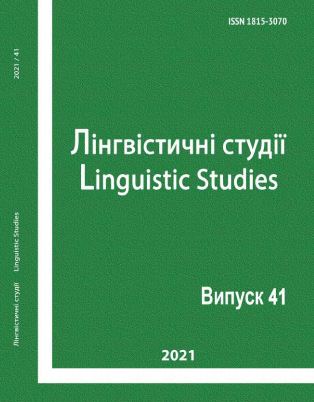Avoiding Translation Mistakes While Rendering The Names Of «Alien» Emotions Into English: Corpus-Based Methodology
DOI:
https://doi.org/10.31558/1815-3070.2021.41.34Keywords:
translation; translation mistake; emotion; emotional notion; corpus-based methodologyAbstract
Regarding the difficulties a translator confronts with while rendering emotions, one should mention at least three cases when a translator needs to reinforce the correctness of the choice as to a counterpart (an equivalent word) of the target language by means of scientifically valid conclusions: 1) if there are doubts as to accuracy of the lexical counterpart in the target language that denotes a certain emotional notion fixed by bilingual dictionaries; 2) if lexical counterparts are absent in dictionaries at all; 3) if not only dictionary counterparts are absent but also an emotional notion itself is irrelevant (not typical) for the target linguoculture.
References
Мізін, Костянтин. «“Німецька затишність” як риса національного характеру: зіставнолінгвокультурологічний аналіз». Лінгвістичні студії / Linguistic Studies 36, 2018: 61–67. Print.
Becker, Eni. Angst. München & Basel: Ernst Reinhardt Verlag, 2011. Print.
Cope, A., Oattes, G., Hussey, W. Zest: How to Squeeze the Max out of Life. Oxford: Capstone, 2019. Print.
Demmerling, Ch., Landweer, H. Philosophie der Gefühle. Von Achtung bis Zorn. Stuttgart: Metzler, 2007. Print.
Dorren, Gaston. Lingo: Around Europe in Sixty Languages. New York: Atlantic Monthly Press, 2015. Print.
Elfenbein, H. A., Ambady, N. «On the Universality and Cultural Specificity of Emotion Recognition: A Meta-analysis». Psychological Bulletin 128(2), 2002: 203–235. Web. 07 Jan. 2021.
Friedlmeier, W., Corapci, F., Cole, P. M. «Socialization of Emotions in Cross-cultural Perspective». Social and Personality Psychology Compass 5(7), 2011: 410–427. Web. 06 Jan. 2021.
Fuchs, Th., Micali, S. «Phänomenologie der Angst». [In:] L. Koch (Hrsg.) Angst. Ein interdisziplinäres Handbuch. Stuttgart & Weimar: Metzler, 2013, 61–71. Web. 14 Jan. 2021.
Levenson, R. W. «Basic Emotion Questions». Emotion Review 3(4), 2011: 379–386. Web. 01 Jan. 2021.
Mizin, K., Letiucha, L., Petrov, O. «Deutsche linguokulturelle Konzepte im Lichte der germanisch-ostslawischen Kontraste: Methode zur Feststellung von spezifischen bzw. einzigartigen Bedeutungen». Germanoslavica 30(1), 2019: 49–70. Print.
Mizin, K., Letiucha, L. «The Linguo-cultural Concept TORSCHLUSSPANIK as the Representative of Ethno-specific Psycho-emotional State of Germans». Психолінгвістика. Психолингвистика. Psycholinguistics 25(2), 2019: 234–249. Print.
Mizin, K., Ovsiienko, L. «The German Linguo-cultural Concept SCHADENFREUDE in Crosscultural Perspective: A Corpus-based Approach». Lege Artis. Language Yesterday, Today, Tomorrow. The Journal of University of SS Cyril and Methodius in Trnava V(1), 2020: 143–184. Web. 07 Jan. 2021.
Oster, Ulrike. «“Angst” and “Fear” in Contrast: A Corpus-based Analysis of Emotion Concepts». [In:] M. Brdar, I. Raffaelli, Ž. M. Fuchs (Eds.) Cognitive Linguistics between Universality and Variation. Newcastle upon Tyne: Cambridge Scholars Publishing, 2012, 327–355. Web. 14 Jan. 2021.
Plutchik, Robert. «A General Psychoevolutionary Theory of Emotion». [In:] R. Plutchik & H. Kellerman (Eds.) Emotion: Theory, Research and Experience, Theories of Emotion. New York: Academic Press, 1980, Vol. 1, 3–33. Web. 15 Jan. 2021.
Plutchik, R., Conte, H. R. (Eds.). Circumplex Models of Personality and Emotions. Washington, DC: American Psychological Association, 1997. Web. 07 Jan. 2021.
Portmann, John. «Left Behind: Torschlusspanik and Anxiety». Philosophia 46(3), 2018:761–770. Web. 01 Jan. 2021.
Schwarz-Friesel, Monika. «Sprache, Kognition und Emotion: Neue Wege in der Kognitionswissenschaft». [In:] H. Kämper, L. M. Eichinger (Hrsg.) Sprache – Kognition – Kultur. Sprache zwischen mentaler Struktur und kultureller Prägung. Berlin & New York: de Gruyter, 2008, 277– 301. Web. 07 Jan. 2021.
Wierzbicka, Anna. Emotions Across Languages and Cultures: Diversity and Universals. Cambridge: Cambridge University Press, 1999. Print.


